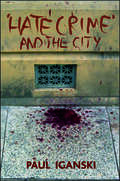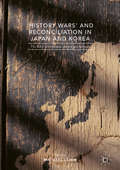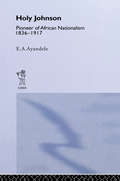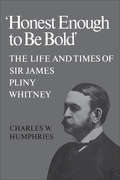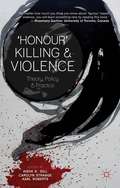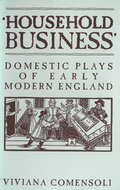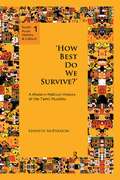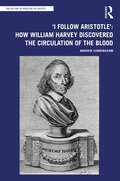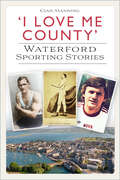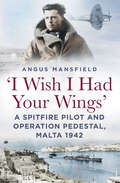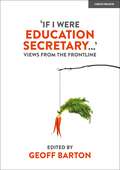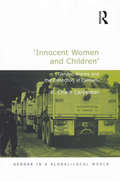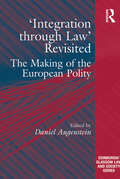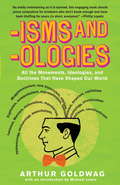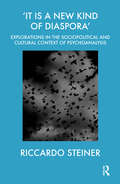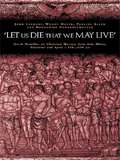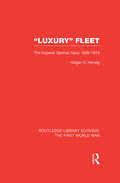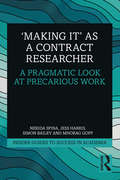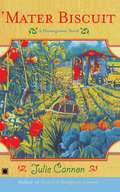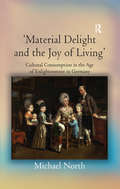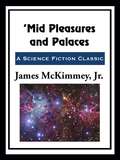- Table View
- List View
'Hate crime' and the city
by Paul IganskiThe impression often conveyed by the media about hate crime offenders is that they are hate-fuelled individuals who, in acting out their extremely bigoted views, target their victims in premeditated violent attacks. Scholarly research on the perpetrators of hate crime has begun to provide a more nuanced picture. But the preoccupation of researchers with convicted offenders neglects the vast majority of hate crime offenders that do not come into contact with the criminal justice system. This book, from a leading author in the field, widens understanding of hate crime by demonstrating that many offenders are ordinary people who offend in the context of their everyday lives. Written in a lively and accessible style, the book takes a victim-centred approach to explore and analyse hate crime as a social problem, providing an empirically informed and scholarly perspective. Aimed at academics and students of criminology, sociology and socio-legal studies, the book draws out the connections between the individual agency of offenders and the background structural context for their actions. It adds a new dimension to the debate about criminalising hate in light of concerns about the rise of punitive and expressive justice, scrutinizing the balance struck by hate crime laws between the rights of offenders and the rights of victims.
'Hind Swaraj' and Other Writings
by Mahatma Gandhi Anthony J. ParelHind Swaraj is Mahatma Gandhi's fundamental work. Not only is it key to understanding his life and thoughts, but also the politics of South Asia in the first half of the twentieth century. Celebrating 100 years since Hind Swaraj was first published in a newspaper, this centenary edition includes a new Preface and Editor's Introduction, as well as a new chapter on 'Gandhi and the 'Four Canonical Aims of Life''. The volume presents a critical edition of the 1910 text of Hind Swaraj, fully annotated and including Gandhi's own Preface and Foreword (not found in other editions). Anthony J. Parel sets the work in its historical and political contexts and analyses the significance of Gandhi's experiences in England and South Africa. The second part of the volume contains some of Gandhi's other writings, including his correspondence with Tolstoy and Nehru.
'History Wars' and Reconciliation in Japan and Korea: The Roles of Historians, Artists and Activists
by Michael LewisThis book provides a fresh approach to understanding the origins and possible future direction of the Northeast Asia “history wars.” Leading scholars in history, literary studies, and education present the complex issue in a historical context by assessing its political and cultural dimensions, particularly with regards to relations between Japan and Korea. Their essays also touch on the significance of civil society efforts to advance peaceful reconciliation and the social and political forces that have worked to frustrate such efforts since 1945. At its core, this volume explores the political significance in the gap between Korean and Japanese civil society versus governmental efforts to resolve issues lingering from the Pacific War in Asia; the significance of cultural as well as political efforts to understanding historical and contemporary relations among Northeast Asian neighboring states; and specific factors―such as textbook reform, revised school curricula, and civil society education efforts― that are working to ameliorate the heretofore deadlocked “history wars.”
'Holy' Johnson, Pioneer of African Nationalism, 1836-1917
by E.A. AyandeleA biography of one of the great 19th-century Africans and an insightful analysis of one of the earlier phases of African nationalism.
'Honest Enough to Be Bold': The Life and Times of Sir James Pliny Whitney
by Charles HumphriesOn a promise of 'Clean, Uncorrupt, and Incorruptible Government,' James Pliny Whitney marked the end of an era of Liberal rule that had lasted for over three decades, and introduced to the province a new, 'progressive' brand of conservatism. As this lively biography demonstrates, Whitney was a gruff and forceful leader. He had a keen understanding of the social and technological forces that were changing Ontario so dramatically in the early twentieth century; he also understood, better than the Liberals, the political implications of those forces. The policies of his government extended to hydroelectric power, bilingual schools, northern development, automobile regulation, temperance (he dealt with the advocates of prohibition 'through gritted teeth'), imperial unity, housing, workmen's compensation, and the suffrage movement. (In a lapse from progressiveness, he argued that women should not be exposed to 'the unlovely influence of party politics.') He had a lasting influence on higher education in the province through the establishment of a Board of Governors for the University of Toronto, then unmistakably the provincial university of Ontario, and the provision of tenure for its full professors. Whitney liked to describe himself as 'bold enough to be honest ... honest enough to be bold.' Humphries concludes that as premier from 1905 to 1914 Whitney lived up to his self-description. The boldness of his legislative programs recognized the evolution of a new industrial society and paved the way for government to intervene in economic and social affairs. The success of his progressive conservatism laid the foundation for decades of Tory success in Ontario.
'Honour' Killing and Violence: Theory, Policy and Practice
by Aisha K. Gill Carolyn Strange Karl RobertsIn this interdisciplinary collection leading experts and scholars from criminology, psychology, law and history provide a compelling analysis of practices and beliefs that lead to violence against women, men and children in the name 'honour'.
'Household Business'
by Viviana ComensoliThe domestic play flourished on the English popular stage during the late sixteenth and early seventeenth centuries. Its roots were predominantly native, rather than classical, and its mainspring was the staging of domestic conflict amongst English characters from the middle ranks of society. Household Business traces the genre's origins in the cycle plays of medieval England and examines its aesthetic configurations in relation to extra-literary discourses and practices that underwrote Renaissance ideologies of private life. At a time when the orthodox view of the family defined it as the foundation of the social order, a number of domestic dramas took a more critical perspective, stressing the contradictions and struggles that attend marriage and the patriarchal family.In addition to well-known domestic dramas as A Woman Killed with Kindness, Arden of Feversham, The Witch of Edmonton, and A Yorkshire Tragedy, Viviana Comensoli analyzes less well-studied plays as A Warning for Fair Women, Two Lamentable Tragedies, and The Late Lancashire Witches. The book also provides an extensive and timely assessment of domestic comedy, demonstrating how plays such as The London Prodigal, The Fair Maid of Bristow, and The Honest Whore (Parts I and II) resist homiletic paradigms in favour of a more dialectical dramaturgy.
'How Best Do We Survive?': A Modern Political History of the Tamil Muslims (South Asian History and Culture)
by Kenneth McPhersonThis book traces the social and political history of the Muslims of south India from the later nineteenth century to Independence in 1947, and the contours that followed. It describes a community in search of political survival amidst an ever-changing climate, and the fluctuating fortunes it had in dealing with the rise of Indian nationalism, the local political nuances of that rise, and its own changing position as part of the wider Muslim community in India. The book argues that Partition and the foundation of Pakistan in 1947 were neither the goal nor the necessarily inescapable result of the growth of communal politics and sentiment, and analyses the post-1947 constructions of events leading to Partition. Neither the fact of Muslim communalism per se before 1947 nor the existence of separate Muslim electorates provide an explanation for Pakistan. The book advances the theory that micro-level studies of the operation of the former, and the defence of the latter, in British India can lead to a better understanding of the origins of communalism. The book makes an important contribution to understanding and dealing with the complexities of communalism — be it Hindu, Muslim or Christian — and its often tragic consequences.
'I Follow Aristotle': How William Harvey Discovered the Circulation of the Blood (The History of Medicine in Context)
by Andrew CunninghamThis book presents a new interpretation of how and why the discovery of the circulation of the blood in animals was made. It has long been known that the English physician William Harvey (1578–1657) was a follower of Aristotle, but his most strikingly ‘modern’ and original discovery – of the circulation of the blood – resulted from Harvey following Aristotle’s ancient programme of investigation into animals. This is a new reading of the most important discovery ever made in anatomy by one man and produces not only a radical re-reading of Harvey as anatomist, but also of Aristotle and his investigations of animals.
'I Love Me County': Waterford Sporting Stories
by Cian ManningWaterford, the Gentle County, can boast a proud sporting tradition that is as long as it is unusual. Ireland’s oldest city has witnessed many trends, from blood sports like bull-baiting in Ballybricken to roller hockey at the Olympia Ballroom. But the towns and villages of County Waterford were not to be overshadowed, producing notable sports people such as basketballers and boxers.In ‘I Love Me County’, learn about everyone from camogie pioneers to World Champions, as this collection of stories records the lives, loves and losses of some of Waterford’s forgotten sporting heroes, demonstrating the importance of sport and leisure in the history of the county.
'I Wish I Had Your Wings': A Spitfire Pilot and Operation Pedestal, Malta 1942
by Angus MansfieldIn August 1942, British launched Operation Pedestal in an attempt to deliver supplies to the stricken island of Malta, an Allied base which had been under Axis blockade for months. From 9–15 August a convoy of some 50 ships ran the gauntlet of Axis bombers, submarines, E-boats and minefields. Of the original fourteen merchant vessels, only five reached Malta Grand Harbour. In 'I Wish I Had Your Wings', Angus Mansfield relates the experiences of two men involved in Pedestal, Captain David Macfarlane of MV Melbourne Star and his nephew David Mejor, one of the Spitfire pilots who fought to protect the convoy. Told using their log books, letters and papers, this is the story of one family’s contribution to a relief operation that cost over 400 Allied lives, but which has gone down in history as one of the most important British strategic victories of the Second World War.
'If I Were Education Secretary...': Views from the frontline
by Geoff Barton"Why do they have to keep on changing things?" It's a characteristic complaint from teachers and leaders in all parts of the UK, but especially in England.Our political system means we are locked into short-term cycles. Politicians come and politicians go. In education departments it means there is a revolving door of ministers, each often eager to implement their own priorities and projects.Civil servants jump, new directions are announced, plans are made ... and then suddenly the minister is promoted, moved to a new department, or dismissed.It's no wonder that lurches in education policy can feel so bewilderingly frequent and uncoordinated. And it's also no wonder that teachers can become demoralised, be left feeling deskilled, and feel cynical about the role of politicians.So how can we change this?This book collects the views of serving school and college leaders, of policy-makers, and of former education secretaries. It asks them what they would do if they were in charge, and it asks those who were once in charge what they would do differently.'If I Were Education Secretary ...' provides a fascinating glimpse into education policy as it is now - but also a template for how it could become more powerfully coherent in the future, moving a good education system to genuinely world class.
'If I Were Education Secretary...': Views from the frontline
by Geoff Barton"Why do they have to keep on changing things?" It's a characteristic complaint from teachers and leaders in all parts of the UK, but especially in England.Our political system means we are locked into short-term cycles. Politicians come and politicians go. In education departments it means there is a revolving door of ministers, each often eager to implement their own priorities and projects.Civil servants jump, new directions are announced, plans are made ... and then suddenly the minister is promoted, moved to a new department, or dismissed.It's no wonder that lurches in education policy can feel so bewilderingly frequent and uncoordinated. And it's also no wonder that teachers can become demoralised, be left feeling deskilled, and feel cynical about the role of politicians.So how can we change this?This book collects the views of serving school and college leaders, of policy-makers, and of former education secretaries. It asks them what they would do if they were in charge, and it asks those who were once in charge what they would do differently.'If I Were Education Secretary ...' provides a fascinating glimpse into education policy as it is now - but also a template for how it could become more powerfully coherent in the future, moving a good education system to genuinely world class.
'Inflation Targeting Lite' in Small Open Economies: The Case of Mauritius
by Nathan Porter James Yudong YaoA report from the International Monetary Fund.
'Innocent Women and Children': Gender, Norms and the Protection of Civilians (Gender in a Global/Local World)
by R. Charli CarpenterExamining the influence of gender constructs on the international regime protecting war-affected civilians, R. Charli Carpenter examines how in practice belligerents, advocates and humanitarian players interpret civilian immunity so as to leave adult civilian men and older boys at grave risk in conflict zones. Providing a wealth of ground-breaking case studies, the author argues that in order to understand the way in which laws of war are implemented and promoted in international society we must understand how gender ideas affect the principle of civilian immunity. Each case study demonstrates the importance of assumptions about gender relations in shaping international politics, and in developing a framework for incorporating an attention to gender into the often gender-blind scholarship on international norms. As such, this book will be of interest to international relations theorists and to human rights scholars, students and activists alike.
'Integration through Law' Revisited: The Making of the European Polity
by Daniel AugensteinOver the last twenty years, processes of pluralization, differentiation and trans-nationalization in the European Union have arguably challenged the centrality of law to European integration. Yet these developments also present opportunities to investigate new understandings of law triggered by European integration. The contributors to this book revisit one of the first academic projects to conceptualise and study European legal integration - the early 'Integration through Law' School. On this basis, they consider continuities and discontinuities in the underlying social and political landscape which the law is to integrate (the 'object' of integration), the forms and capacities of the law itself (the 'agent' of integration), and the way these two dimensions reflect on each other. Displaying different normative concerns and varied theoretical starting points, all contributors maintain that 'integration through law' remains of enduring significance to the European integration process. The volume provides a valuable reference for scholars in the field of European integration studies and European legal and political theory.
'Isms & 'Ologies
by Arthur GoldwagHave you ever wondered about the difference between Fundamentalism and Evangelicalism and which influenced the other? Do you know where Post-modernism stops and Post-structuralism begins? Would you like to? From Platonism to New Historicism, humankind is constantly coming up with fresh schools of thought to help explain (or at least describe) the mysterious world around us. Here is the ultimate guide to over 450 of the most significant intellectual terms, movements, and religions that help shape the society we live in. Simply, concisely, and with personality, 'Isms and 'Ologies clarifies buzz terms like jihad, often defined as "holy war" but which literally means "striving" ;and illustrates the differences between Conservatism, Paleoconservatism, and Neoconservatism. It explains String Theory (which attempts to unify Quantum Mechanics and Einsteinian Relativity); describes Fauvism (an artistic movement that paved the way for Expressionism and Cubism); defines Locofocoism (an American political ideology named after a "self-lighting cigar)"; and identifies and explores so much more. Helpfully divided into categories-including politics, history, philosophy and the arts, economics, religion, science, and medicine-cross referenced, and thoroughly indexed, 'Isms and 'Ologies is a must have for the budding intellectual in everyone.
'It is a New Kind of Diaspora': Explorations in the Sociopolitical and Cultural Context of Psychoanalysis
by Riccardo SteinerRiccardo Steiner, one of the most well known historians of psychoanalysis, has in the numerous papers in this volume traced the relationship between psychoanalysis and the larger cultural sphere with clarity and erudition. In this, his first book, he examines the effects of the 'new diaspora' in the field - the emigration of German and Austrian analysts during the Nazi persecution, especially to London. In particular he draws upon the correspondence between Ernest Jones and Anna Freud to illuminate the attitudes of those two central figures to 'the politics of emigration'.
'Lector Ludens'
by Michael SchamIn sixteenth- and seventeenth-century Spain, debating the acceptability of games and recreation was serious business. With Lector Ludens, Michael Scham uses Cervantes's Don Quijote and Novelas ejemplares as the basis for a wide-ranging exploration of early modern Spanish views on recreations ranging from cards and dice to hunting, attending the theater, and reading fiction.Shifting fluidly between modern theories of play, little-known Spanish treatises on leisure and games, and the evidence in Cervantes's own works, Scham illuminates Cervantes's intense fascination with games, play, and leisure, as well as the tensions in early modern Spain between the stern moralizing of the Counter-Reformation and the playfulness of Renaissance humanism.
'Let us die that we may live': Greek homilies on Christian Martyrs from Asia Minor, Palestine and Syria c.350-c.450 AD
by Pauline Allen Wendy Mayer Boudewijn Dehandschutter Johan LeemansThis book presents fresh, lively translations of fourteen such homilies, the majority for the first time in English. The homilies were delivered in some of the main cities of the Greek East of the later Roman Empire, by well-known figures such as Basil of Caesarea, Gregory of Nyssa and John Chrysostom, as well as the equally gifted preachers Asterius of Amasea and Hesychius of Jerusalem.'Let us die that we may live' offers an approachable, surprising, and not always reverent insight into the life of the Early Church. It reveals the full importance of the martyr homily in terms of style, treatment of its subject, and social and liturgical issues, in a way that will be useful across disciplines such as theology, classical studies, and religion.
'Luxury' Fleet: The Imperial German Navy 1888-1918 (Routledge Library Editions: The First World War)
by Holger H. HerwigOriginally published in 1980 ‘Luxury’ Fleet (the phrase was Winston Churchill’s) was the first history of the Imperial German navy from 1888 to 1918. After tracing the historical background to German naval ambitions, the first two sections of the book analyse Admiral Tirpitz’s programme of building a battle fleet strong enough to engage the Royal Navy in the North Sea. The author shows the fleet in its European setting and describes the warships and the attitudes of the officer corps and seamen. The final section of the book discusses the tactical deployment of the German fleet during the First World War, both in home waters and overseas; and it weighs the balance between those who supported fleet actions in preference to those who favoured cruiser and submarine warfare.
'Making It' as a Contract Researcher: A Pragmatic Look at Precarious Work (Insider Guides to Success in Academia)
by Simon Bailey Jess Harris Nerida Spina Mhorag GoffThe ‘Insider Guides to Success in Academia’ offers support and practical advice to doctoral students and early-career researchers. Covering the topics that really matter, but which often get overlooked, this indispensable series provides practical and realistic guidance to address many of the needs and challenges of trying to operate, and remain, in academia. These neat pocket guides fill specific and significant gaps in current literature. Each book offers insider perspectives on the often implicit rules of the game – the things you need to know but usually aren’t told by institutional postgraduate support, researcher development units, or supervisors – and will address a practical topic that is key to career progression. They are essential reading for doctoral students, early-career researchers, supervisors, mentors, or anyone looking to launch or maintain their career in academia. ‘Making It’ as a Contract Researcher examines the contemporary experience of research employment in universities from the perspective of a significant yet often invisible group: temporary or contract researchers, who make up a substantial, and ever-growing, proportion of the academic research workforce. A critical, pragmatic and international account of the contemporary research career, this book explores the question of what it means to ‘make it’ as a contract researcher in academia, and how individuals and organisations in higher education might seek to do things differently. Providing the reader with practical and realistic strategies for improving the experience of being a contract researcher and achieving and sustaining an academic research career, this book guides the reader on a range of topics, including: Charging fairly for your work Building a publication track record Finding the next contract Sustaining your network Feeling like you belong Moving beyond contract research. Using a combination of current research, interviews and reflective writing, the book is written specifically for and by contract researchers in academia, offering unique and extremely valuable advice for all new and current contract researchers, including PhD students, early career researchers, and any party interested in pursuing a research career in academia.
'Mater Biscuit
by Julie CannonFrom the author of Truelove & Homegrown Tomatoes comes a heartwarming story of three generations of Southern women working to mend the rifts of the past and set paths for the future. It is summer in Euharlee, Georgia, and Imogene Lavender's garden is bursting with snap beans, okra, and tomatoes. The household -- made up of Imo; her daughter Jeanette and her new baby; and Lou, Imo's niece -- is about to grow as well. Imo's estranged mother, Mama Jewell, has begun to show signs of senility, and Imo has decided that it is her duty to take her mother in. Mama Jewell brings with her some secrets from the past, including the story of Lou's mother, a revelation that sends Lou in search of her ne'er-do-well father. For Imo, who is feeling the squeeze of being in the middle of the generations, Mama Jewell's temperamental nature stirs up long-buried memories of a difficult childhood. And much to everyone's surprise, wild Jeanette is so determined to find a husband that she joins the church choir to be closer to the handsome and enigmatic young reverend. 'Mater Biscuit is a wonderful evocation of small-town life in the South, a world where hard work and prayers unite the community. Life isn't always easy for Imo and her girls, but they have only to look as far as Imo's beloved garden to be reminded that all things change with the seasons.
'Material Delight and the Joy of Living': Cultural Consumption in the Age of Enlightenment in Germany
by Michael NorthEighteenth-century Europe witnessed a commercialization of culture as it became less courtly and more urban. The marketing of culture became separate from the production of culture. New cultural entrepreneurs entered the stage: the impresario, the publisher, the book seller, the art dealer, the auction house, and the reading society served as middlemen between producers and consumers of culture, and constituted at the same time the beginning of a cultural service sector. Cultural consumption also played a substantial role in creating social identity. One could demonstrate social status by attending an auction, watching a play, or listening to a concert. Moreover, and eventually more significant, one could demonstrate connoisseurship and taste, which became important indicators of social standing. The centres of cultural exchange and consumption were initially the great cities of Europe. In the course of the eighteenth century, however, cultural consumption penetrated much deeper, for example into the numerous residential and university towns in Germany, where a growing number of functional elites and burghers met in coffee houses and reading societies, attended the theatre and opera, and performed orchestral and chamber music together. Journals, novels and letters were also crucial in forming consumer culture in provincial Germany: as the German states were remote from the cultural life of England and France, the material reality of London and Paris often passed as a literary construction to Germany. It is against this background, and stimulated by the research of John Brewer on England, that the book systematically explores this field for the first time in regard to the Continent, and especially to eighteenth-century Germany. Michael North focuses, chapter by chapter, on the new forms of entertainment (concerts, theatre, opera, reading societies, travelling) on the one hand and on the new material culture (fashion, gardens, country houses, furniture) on the other. At the centre of the discussion is the reception of English culture on the Continent, and the competition between English and French fashions in the homes of German elites and burghers attracts special attention. The book closes with an investigation of the role of cultural consumption for identity formation, demonstrating the integration of Germany into a European cultural identity during the eighteenth century.
'Mid Pleasures and Palaces
by James McKimmey, Jr.It was, Kirk thought, like standing in a gully, watching a boulder teeter precariously above you. It might fall at any minute, crushing your life out instantly beneath its weight. Your only possible defenses are your brain and voice—but how do you argue with a boulder which neither sees nor hears?
